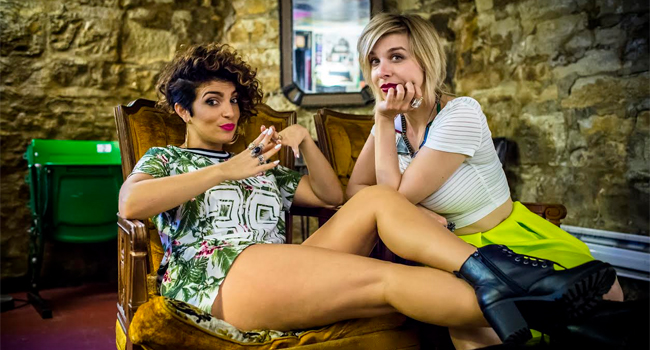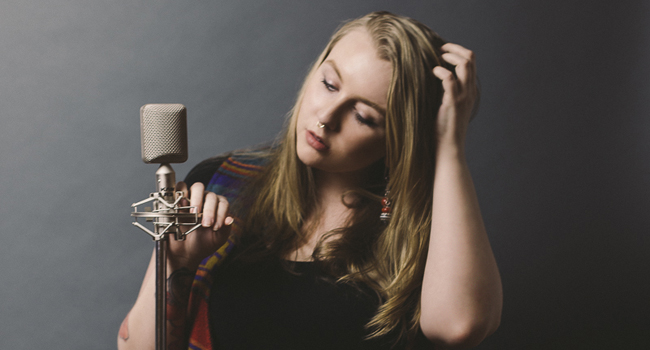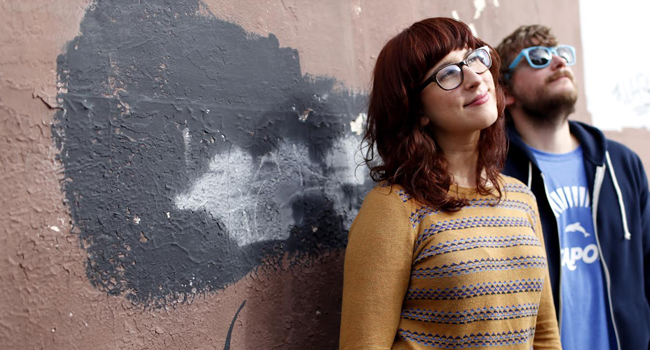After ordering the split Slowness “Race to Mars”/Dead Leaf Echo “Act of Truth” 7-inch, Pop ‘stache reached out to Dead Leaf Echo, and after a lengthy exchange of emails between P ‘s and DLE’s frontman LG Galleon—which started with a mutual affinity for Black Tambourine—P ‘s sat with two of the three members from Dead Leaf Echo, LG and Ana Breton, after the soundcheck for their show at the Cameo Gallery in Brooklyn, NY in early September.
Pop ‘stache: You formed in 2006. Where did you come from and how did you meet?
LG Galleon: I’ve been in the city since 2001. My first place was on the Upper West Side, like Morning Side Heights. It’s actually this little area called Manhattan Valley which is from 103rd to 100th. It’s too far east for the Columbia contingent and it was still very ghetto.
P ‘s: So, are you originally from the city?
LG: No, we’re both from DC.
Ana Breton: We are both from DC but we met in New York. Christo is from Boston and we all seemed to convene upon the same scenes. I kept running into LG at shows in NY and we’d talk and find we had so many things in common—DC being one of them but also LG was one of the few people that liked almost exactly the same subset of bands that I did. It was like he had the same religion. It seemed inevitable that we would play music together.
P ‘s: DC has a pretty interesting music scene.
LG: Yeah, I mean when we were there it was awesome. Better than it is now, kind of in its heyday.
A: I’m definitely into the whole old school Slumberland, Teen Beat, Simple Machines, all those old DC labels.
P ‘s: LG and I kind of connected on Slumberland when we were emailing back and forth about Black Tambourine and the 5-day Chickfactor 20 festival.
LG: Oh yeah!
A: We did all the nights. DC and here. [laughs]
P ‘s: Ugh, I’m incredibly jealous.
LG: The only band that I had already seen was Frankie Rose. She was one of the newer bands as opposed to most everyone else who were part of the original scene. We play in DC a lot still.
P ‘s: I saw that you had some dates there after a few shows on the West Coast.
LG: Yeah, leaving Monday. We’re doing some shows in San Francisco to start.
P ‘s: Now is this your first “national” tour, or at least the first time that you’ve ventured away from the East Coast?
LG: Yeah, just the Midwest and we toured the South earlier in the year. We played SXSW last year.
P ‘s: Do you find the venues and/or crowds to be different out there? Obviously you’re kind of an outsider coming in, but are they receptive?
LG: Yeah, a lot of ‘em are. They always use different references when they hear us. They always throw out the more obvious British ones. But they like it for sure.
P ‘s: As far as the songwriting goes, who takes the reins?
LG: I bring the songs in like demos and then we work drum parts and bass.
A: I also really like the way the last album took shape with the touches that Christo brings. He is a true psych-rock aficionado and can pull out a totally unique pedal or keyboard sound that always seems to go perfect. It was so fun to walk in the studio and hear those two making crazy sounds. Christo also has a ton of pedals and I have to credit my sound partially to him because I’ve had one of his pedals on my board at all times. So although LG really crafts the songs, we both add our parts on top. This album was the first time I got to write and record my own vocal harmonies, guitar and key parts with DLE.
P ‘s: Do you ever do the lyrics first, or is it normally the music?
LG: A little bit of both but usually the music comes first. Sometimes you find bits of poetry hanging around that haven’t been used or a favorite line that’s been tucked away.
P ‘s: I have to ask. Were any of you guys English majors?
A: [laughs]
LG: Um, I was a film student.
P ‘s: Well that makes sense; you had directed a number of your music videos.
LG: I had actually filmed and directed all of the music videos up until our last one which just came out.
P ‘s: The visuals are pretty stunning, the whole trippy, inky thing.
LG: Yeah, so we’re going to use that tonight during our show.
P ‘s: Your band bio lists you as an “art project.” You definitely make use of mixed media—music, visual art, cinematography.
LG: Yeah, it was us trying to incorporate a number of different things. We used a lot of Kandinsky symbols, he’s my favorite artist. A lot of the abstraction. I wasn’t really sure if it was going to become a band at first. I wanted to work with videos and music, music to film.
P ‘s: I was impressed by the literary influence of Vladimir Nabokov. Not only the band name, but Pale Fire, the first [album]. He’s a good man to be pulling from.
LG: Yeah, well, pull from the best. I mean he’s one of my favorite novelists. But we try not to do that now as much.
P ‘s: It’s one thing to pay homage to another artist or writer or musician, but you run into a “one-trick-pony” sort of scenario if you rely on it too heavily.
LG: Yeah, well it was kind of when I realized that the medium of the project was going to be more into live music with film as an accentuation than—a lot of bands are just influenced by a bunch of other bands which is what I wanted to stay away from because I’m influenced by a couple of bands, but not a lot of bands.
P ‘s: What artists would you say heavily influence your work?
LG: Robert Smith is huge and a few of the 4AD and Factory bands.
P ‘s: I was going to guess 4AD, you’re not very much like their current roster which is stacked by modern pop standards, but—
LG: Well, it’s different bands and a much different label.
P ‘s: It is, but as far as late ’80s 4AD, Dead Leaf Echo seems like a contemporary spin on that aesthetic.
LG: Cool, yeah, I mean when Ivo was running 4AD with John Fryer, those guys created that whole label. I mean they picked all the bands personally and they recorded them all out of that Black Wing which is the church. So all the bands went through there and the graphic design was so specific with 23 Envelope, with Vaughan Oliver and Nigel Grierson. I don’t think there’s anything like that anymore. I mean 4AD now. Ivo sold the company to Warner in ’93 and with all that Domino and Merge.
P ‘s: Speaking of John Fryer, you’re working with him and Joe Lambert on the newest one?
LG: Yeah, we’ve already finished it with him.
P ‘s: What was it like working with them, particularly John Fryer? He just has a huge repertoire of artists that he’s worked with.
LG: John has a presence. He’s like a rock star character. British, very dry, super gothic, blond pompadour, all leather. He’s living a bit of the dream still. Exotic locales, he lives in Oslo, Norway now which is where we mixed the record.
P ‘s: So you were involved with the mixing of the new record as well?
LG: I actually produced the record, but he mixed it because he’s got the ear.
P ‘s: And with regard to the new record, you have described it as a child’s conception, birth and, I guess, recognition of sentience.
LG: Yes, it’s from another book actually. I decided to build the record around this psychology textbook … “Thought and Language” and it was beautiful and perfect and so I said “Tell me everything about it.” Lev Vygotsky wrote the book but he became obscured because communism was very prevalent at the time and the fact that he died young—but now he’s one of the leading references for speech development in children … I read the book and it wasn’t an easy read, but—I read the book from cover to cover and decided that I wanted to do this bigger album based around the text where it starts with conception, birth, the development of a child, speech, then cognition.
P ‘s: Are songs the narrative in structure?
LG: Well, some songs are done first-person from the child’s perspective throughout his developmental stages and other songs are told from the standpoint of the mother. It’s a concept album but I also tried to avoid specificity. If you look at the lyrics, each track is independent.
P ‘s: Do you have a timetable for the release of Thought and Language?
LG: Well, we released the first single tonight called “Kingmaker.”
P ‘s: So is the game plan to release 7-inch singles and tour, build up some notoriety and then release the album when you’ve reached a level of comfort?
LG: Well we already have another single that’s already in the works. I mean, the album is overdue. And not only did I work with John Fryer, I’m also working with Vaughan Oliver who did all the artwork, so it’s really a total homage to 4AD’s style.
P ‘s: The “historic” 4AD.
LG: Yes, yeah. Personally I don’t think that the 4AD now would be interested in it. We’re trying to figure out who’s going to put it out. We’re still in negotiations with some labels, but nothing’s been finalized. You want it to be special, obviously, with all that time and work put into it.
P ‘s: One thing I was incredibly impressed with is how dense the sound is for a three-piece. How do you manage that sound live as opposed to in the studio?
LG: It’s three guitar players, so it’s a complete “wall of sound” on that end. The bass is sampled, and sometimes depending on the setlist, we have a live drummer. But we can also do shows just the three of us, completely electronic.
A: And during recordings LG will play guitar and bass so you’re hearing more than just three guitars.
LG: Yeah, recording is different.
P ‘s: I was gonna say that it sounds more like six or seven guitars.
LG: Well, since the invention of the 24-track [laughs] things have changed a little bit.
P ‘s: I think “Kingmaker” and “Act of Truth” are great. What is one of the tracks that you’re most proud of?
LG: For a long time the track “Pale Fire.” … We collaborated with Ulrich Schnauss on that who’s an amazing friend, an amazing musician and we look up to him. He’s the one who became serious about the band and really pushed me for a song. We used to play [“Pale Fire”] all the time as our last song of the night and then it got to the point where I felt like we were living and dying by the one song, so we don’t play it anymore.
P ‘s: That track in particular as the title track off Pale Fire seemed to gain you some decent recognition, I mean at least locally in New York City. I actually read the write-up about you in Time Out New York.
LG: Yeah, they’ve been extremely supportive. I don’t know anyone up there personally, but they promoted one of our very first shows. It was at the now defunct Luna Lounge in Williamsburg which is now the Knitting Factory and we played a show there on a Sunday night. They ran a nice big article on us. We didn’t have PR or anything so I’m not sure how they found out about us but when they did this article we were all like “Woah.”
P ‘s: They’ve referred to you as “some of the best live music in the city.”
LG: That was another article where they referenced us and this band Cymbals Eat Guitars which was amazing and then they actually promoted this show at the Cameo today.
P ‘s: Since your project was sort of born here in the city, what are some of the venues that you call “home”?
LG: The Bell House has been awesome because they’re independently run and we have bookers there and it’s just a great space. That’s one of the venues that housed the Chickfactor shows as well. We opened for Chapterhouse there which was a great show. We also did a specialty show for 4AD called “Rage against the dying of the light.”
A: Which took place in the cold winter. We were the only band the night we played and it was sponsored by 4AD. It was fun because they did a lot of free promo giveaways and DJ’s played all the early ’80s era 4AD.
P ‘s: With the trip to the West Coast do you think you guys will find yourselves homesick?
LG: No, not at all. I can’t wait!
A: We’re very excited. The band Slowness that we just did the split “Act of Truth” 7-inch will be touring with us.
LG: Yeah, they’re super nice and I feel like we have a little family out there. It’ll be my first time out there and it’s also going to be my birthday. We’re going to play at this smaller place called Hotel Utah in San Francisco where Red House Painters got their start, another one of my favorites, American Music Club, those guys played there. It’s tiny and intimate, but that will be our first show on the West Coast.
P ‘s: What are some contemporary acts that you either look up to or enjoy playing with?
A: A lot of those DC Slumberland bands like Lorelei.
LG: Yeah, we really like Lorelei and they have a new album out.
A: What’s weird is that a lot of these bands are old bands, like Swervedriver, but they’re still around.
P ‘s: It’s cool because the 2010s have seen the reemergence of some of these dormant bands that never formally broke up but no longer had time to tour or practice.
LG: People take jobs and life happens.
A: As far as contemporary bands, we’re just finding an awesome scene here including some of our friends’ bands like Her Vanished Grace. LG will often jump onstage with them for a song. The first time he did he didn’t tell me. I was so surprised and the energy on stage was super electric.
LG: There’s a lot of local bands. Our friends in California, Nightmare Air, are actually a Film School side project.
A: Incredible noise and one of the most impressive touring outfits you’ve ever seen in a three-piece; some of the coolest, nicest and fun people you’ll ever meet. It’s great when you can genuinely love the music and the people behind it.
LG: We are just lucky to have friends in so many bands all over the world.
P ‘s: That should make touring in the future a whole lot of fun!
One could say more, but DLE’s live performance was sonically dense as promised as well as a sight to behold complete with video projection and the gallery’s fiberoptic chandelier. Simply put, Dead Leaf Echo would be a silly show to miss should the opportunity present itself.
For more information on the band and tour dates check out their site.



